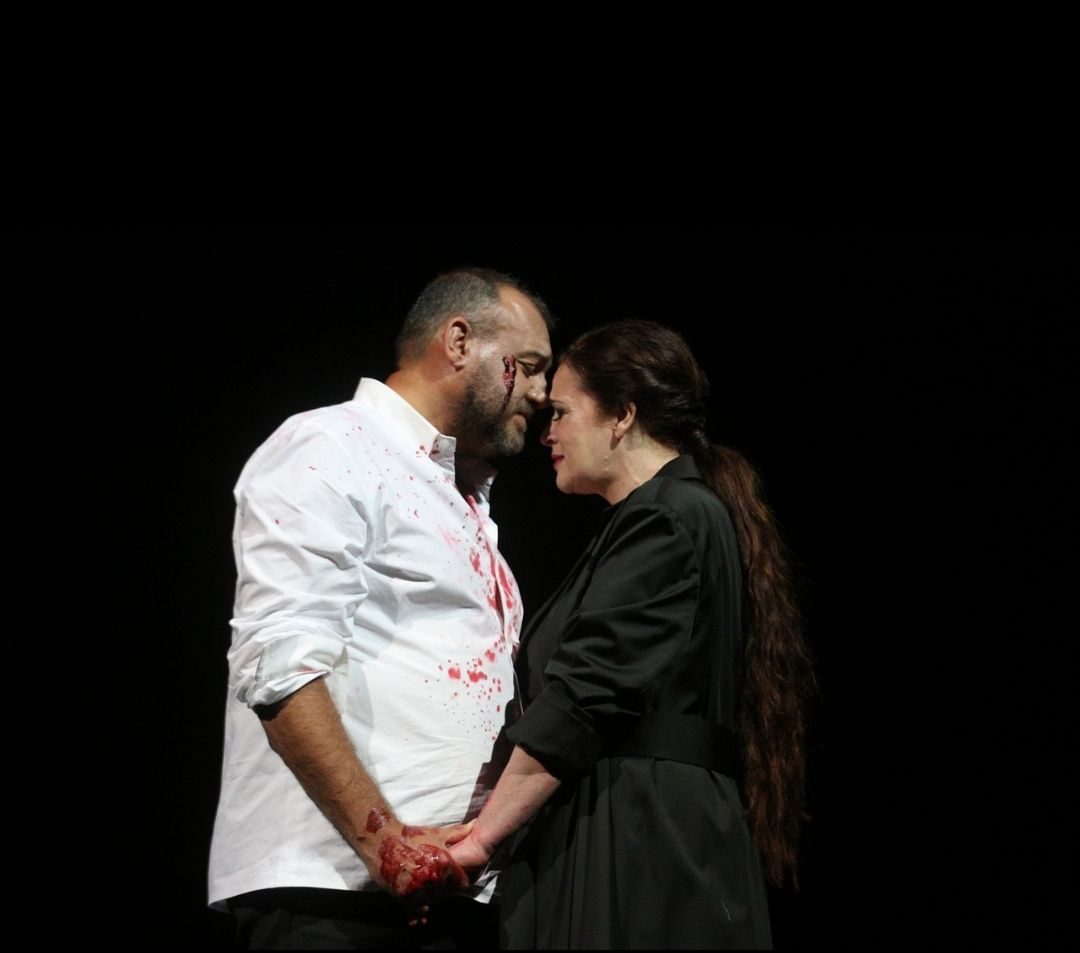Read the continuation of the conversation between Tosca and Cavaradossi, i.e. Maida Hundeling and Dimitris Paksoglou, who will sing together in the Pula Arena tonight on July 7 at 9 PM.
A singing and acting challenge in each of the three completely different acts
Maida: Given the circumstances and the political story of the second act, I received advice from the director that I can’t be so flirtatious with Scarpia. I have to be stricter and respond to him more sharply. There is no pretense as in the first act, as in Tosca’s jealous outburst, for example. Following such a first act, the second act seems to be even crueler.
Dimitris: Of the acting in this Tosca, we can say that the first part is romantic, sensitive. The second part is brutal, powerful. Tosca does something she has never done before and never would have. She’s not like that, and yet she does it. The third act is simpler than anything preceding it. The scene after everything that happened with their “what do we do now,” but so simple and logical. Maida, I don’t know if you see it that way, but everything is very minimalistic. Our movements are like that, too. Tosca is like a movie, absolutely. The acting and movement—everything—are included in Puccini’s music itself. That’s why he’s such a great composer and that’s why I love singing in Tosca so much. I feel a kind of freedom to express myself in millions of different ways because that’s what the music itself offers. From the first moment! Unbelievable music! And one more thing – each of the characters has their own musical theme, which is brilliant.
Maida: That’s right. With Puccini, everyone is important, even when they have only one word or sentence. Puccini has no “Ah, unfortunately, I only sing a small role.” No, everyone contributes and is necessary. Not in how they present themselves, but to the whole atmosphere, the contrasts, connecting everything before and introducing the audience to what follows. They aren’t just some beautiful voices; the Shepherd, Spoletto, Sciarrone. It doesn’t work without them.
Dimitris: Through this opera, we also witness Puccini’s life, his connection with the woman he has loved all his life. He did not appoint a prostitute to commit a crime, but a successful artist who does so because of the violence of the aggressive and blackmailing Scarpia. I think it’s important to keep that in mind, too.
More freedom in this staging
Maida: We believe we have created something brilliant together. Marin Blažević gave us a lot of freedom within the imagining, which we use in the way we feel best while singing our roles. We understood quickly and easily what is required of us and what we want to give.
Dimitris: Whenever you start a new production, you discover something new about the work. What I discovered while working on this Tosca with this team is the naivety of Cavaradossi, his boyish nature. He is guided by the attitude of doing what he first thinks is right. He is overwhelmed with feelings. I would also like to point out the freedom that Maida mentioned. Marin showed us what he envisioned, but left it up to us to express ourselves in those roles.
Maida: I would also add that Giorgio Surian is a great colleague on stage. He loves to play on the stage, and uses every opportunity to try everything the role has to offer and to make it even better, even after all those years and after all those performances. He’s amazing. He is cooperative, playful and open. A man with a big heart.
Dimitris: Yes, absolutely!
A voice that soars over the orchestra to the audience
Maida: At the performance of Tosca on stage in the Rijeka Theatre, the orchestra was behind us due to epidemiological reasons. I had a similar experience in Elektra, but for other reasons. But I love when my voice travels over the orchestra. Audiences. I love the free space for the voice, which we will definitely have in the Arena. How happy I am!
Collaboration with conductor von Steinaecker
Maida: Sometimes you get used to some phrases that you sing in a certain carefree, rehearsed way through so many performances, which can be wrong. The role of the maestro is especially important here; Philipp von Steinaecker warns us very nicely about such situations. I love challenges and it suits me a lot better that way, with small corrections and alterations, than going from place to place, from production to production and singing the same thing all the time.
Tosca and Cavaradossi
Maida: There is a kind of love game between Tosca and Cavaradossi. Tosca is not unkind, rather she is temperamental, she is jealous and moody, she is expressively lunatic, she is distrustful and angry, she calms down the next moment and is sweet and lovely. Cavaradossi knows that. He really knows how to deal with it. At the time in which the plot of the opera takes place, being an unmarried couple was very problematic. Artists are so free and bohemian and live as such. They are strange to everyone. Somehow it is interesting that she is in church and praying, with her relationship the way it is. That’s Tosca. She has no dogmatic beliefs, she is modern.
Dimitris: Tosca is more religious than Cavaradossi.
Maida: Yes, but she’s not a fanatic. You can’t say that, because she was kissing Cavaradossi in the church in front of the statue of the Virgin Mary.
Dimitris: That’s true! (laughter)
Interview by Andrea Labik



